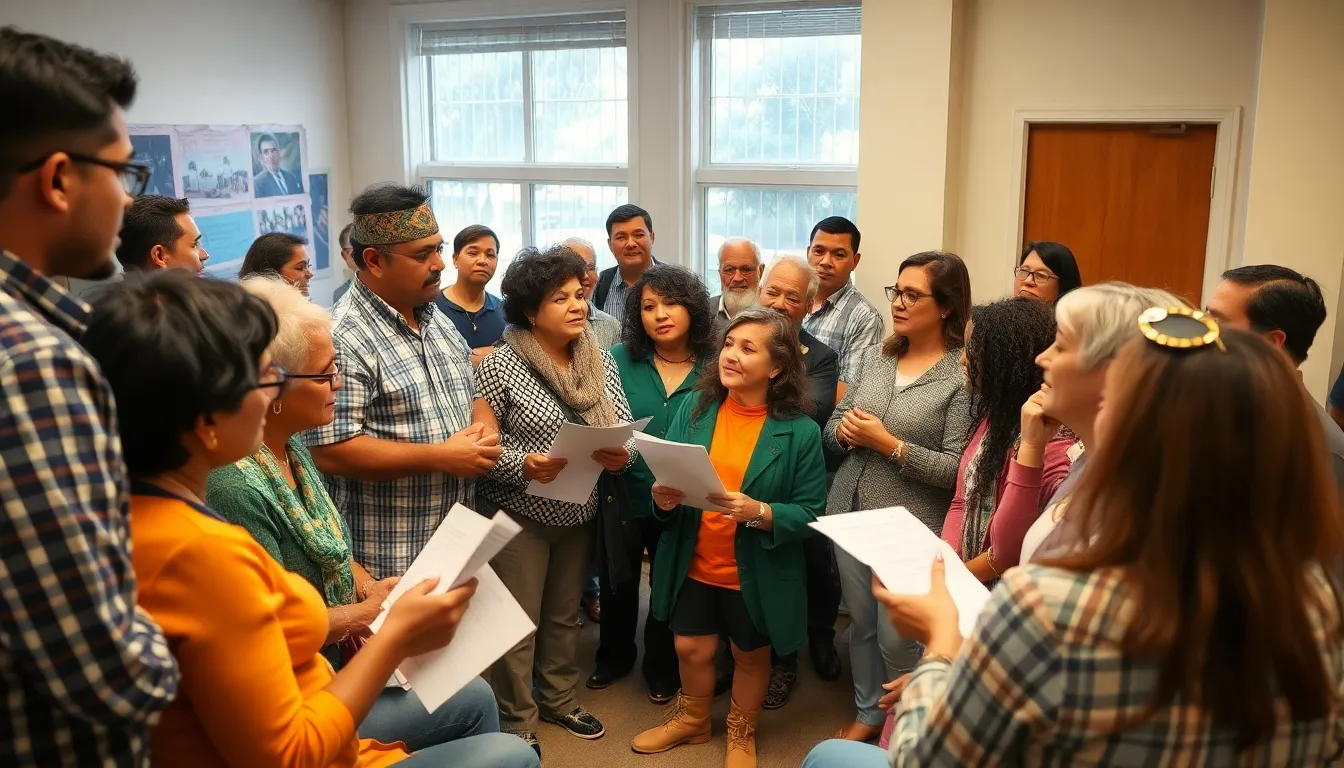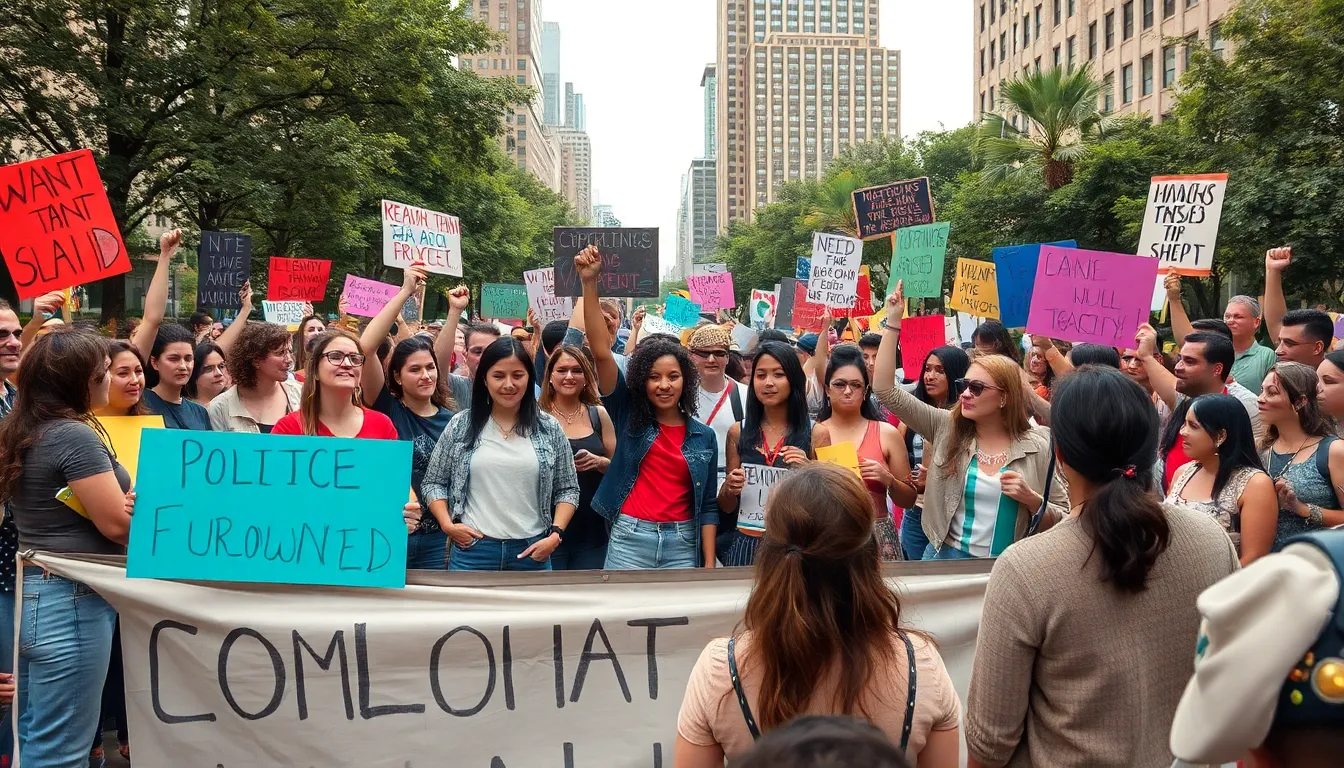Table of Contents
TogglePolitical empowerment isn’t just a buzzword; it’s the key to transforming dreams into reality. It’s like giving a superhero their cape—suddenly, they can fly! When individuals harness the power of their voice, they can challenge the status quo and drive change that resonates far beyond the ballot box.
In a world where opinions are as plentiful as cat videos on the internet, understanding political empowerment can feel like finding a needle in a haystack. But fear not! This journey is about equipping everyone with the tools to navigate the political landscape confidently. From grassroots movements to community engagement, political empowerment is about making sure no one gets left behind—because who wants to be the only one not invited to the party? Let’s dive into what it means to be politically empowered and why it matters more than ever.
Understanding Political Empowerment
Political empowerment enables individuals to influence their communities and societies. It creates pathways for active participation in decision-making processes and policy formulations.
Definition and Importance
Political empowerment refers to the capacity of individuals and groups to shape political outcomes. This empowerment fosters a strong sense of agency, boosting confidence and encouraging participation in civic activities. It serves as a catalyst for social change by mobilizing communities toward collective action. Empowered citizens can challenge injustices while advocating for their rights and interests. This active involvement in governance leads to more equitable policies. Ultimately, the significance of political empowerment lies in its ability to create resilient democracies that reflect diverse perspectives.
Historical Context
The concept of political empowerment has evolved over time, reflecting shifts in societal values and structures. In the early 20th century, movements for women’s suffrage underscored the necessity of inclusive political participation. Civil rights movements in the 1960s further highlighted the importance of representation for marginalized communities. These historical events laid the groundwork for modern notions of empowerment, emphasizing grassroots activism and community organizing. Through these efforts, various social groups gained visibility and influence, reshaping political landscapes globally. Today, the legacy of these movements continues to inspire new generations to advocate for their rights and engage in political processes.
Key Factors Influencing Political Empowerment

Political empowerment hinges on multiple factors that shape individuals’ capabilities to engage in civic life. Understanding these factors reveals pathways to greater participation in political processes.
Education and Literacy
Education plays a crucial role in fostering political empowerment. Individuals with higher education levels often possess better analytical skills, enabling them to navigate complex political landscapes. Literacy further enhances access to information, allowing citizens to engage meaningfully in discussions. Communities that prioritize education tend to see higher voter turnout and involvement in grassroots movements. Equipped with knowledge, individuals feel empowered to advocate for their rights, challenge injustices, and influence policy decisions effectively.
Economic Status
Economic status significantly affects political empowerment. Wealthier individuals often have greater access to resources, including time and money for political engagement. Economic stability allows for participation in campaigns and advocacy efforts. Conversely, lower economic status can hinder access to political opportunities, reducing individuals’ capabilities to shape policies. Encouraging equitable economic growth fosters conditions for disenfranchised groups to increase their political influence. Addressing economic disparities creates a more inclusive political landscape where all voices have the potential to be heard.
Strategies for Promoting Political Empowerment
Political empowerment encompasses various strategies that amplify voices and enhance participation in the political arena.
Grassroots Movements
Grassroots movements play a pivotal role in promoting political empowerment. These movements mobilize community members to advocate for change, often sparking significant political action. Local organizations engage individuals through awareness campaigns and community events, fostering a sense of belonging and ownership. Inclusive representation in these movements ensures diverse perspectives are heard and considered. For instance, successful campaigns like Black Lives Matter and the Women’s March demonstrate collective strength and determination. Such efforts often lead to enhanced voter mobilization and increased civic engagement. Overall, grassroots movements serve as foundational tools in the fight for social justice and political representation.
Policy Reforms
Policy reforms contribute significantly to fostering political empowerment. Changes in laws and regulations can dismantle barriers that impede participation, promoting equitable access to political processes. For example, efforts to expand voting rights directly impact voter turnout and engagement rates. Implementing inclusive policies inspires marginalized communities, encouraging active involvement in decision-making. Furthermore, education reforms that promote civic knowledge equip individuals with the necessary skills to navigate political landscapes effectively. Lastly, local governments can create initiatives that prioritize underrepresented populations, ensuring their voices shape policies that affect them. Such reforms lead to a more vibrant and participatory democracy.
Challenges to Political Empowerment
Political empowerment faces several challenges that hinder progress and inclusivity. These challenges range from institutional barriers to societal norms, making it essential to address them comprehensively.
Institutional Barriers
Institutional barriers significantly affect political empowerment. Restrictions in voting processes create obstacles for marginalized groups, limiting their participation. Inadequate representation in government entities often translates to policies that do not address the needs of specific communities. Additionally, bureaucratic inefficiencies can frustrate efforts for civic engagement. Compliance with complicated regulations may prioritize established voices over newcomers. Raising awareness of suppressive practices fosters a culture of accountability. Institutional reform is crucial for ensuring equitable access to political processes.
Societal Norms
Societal norms also play a prominent role in challenging political empowerment. Gender biases can hinder women from pursuing leadership roles in politics, entrenching traditional expectations. Cultural stereotypes often perpetuate the belief that only certain demographics should engage in political discourse. This marginalization limits diverse perspectives and stifles innovation in policy-making. Peer pressure may discourage individuals from voicing dissenting opinions, further entrenching the status quo. Challenging these norms requires education and advocacy. Engaging communities in discussions about inclusivity fosters a more supportive environment for political action.
Political empowerment stands as a vital force in shaping equitable societies. By fostering an environment where every voice matters individuals can challenge injustices and drive meaningful change. The journey toward empowerment requires collective action and a commitment to inclusivity ensuring that all perspectives are represented in the political arena.
As communities rally together to advocate for their rights they not only inspire future generations but also strengthen the democratic fabric of society. Overcoming barriers and embracing grassroots movements will pave the way for a more engaged citizenry ready to tackle the challenges of today and tomorrow. Political empowerment isn’t just a concept; it’s a necessary catalyst for progress and social justice.




